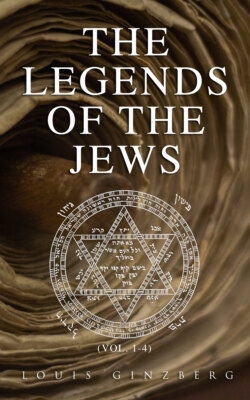Читать книгу The Legends of the Jews (Vol. 1-4) - Louis Ginzberg Ginzberg - Страница 36
На сайте Литреса книга снята с продажи.
FRATRICIDE
ОглавлениеThe slaying of Abel by Cain did not come as a wholly unexpected event to his parents. In a dream Eve had seen the blood of Abel flow into the mouth of Cain, who drank it with avidity, though his brother entreated him not to take all. When she told her dream to Adam, he said, lamenting, "O that this may not portend the death of Abel at the hand of Cain!" He separated the two lads, assigning to each an abode of his own, and to each he taught a different occupation. Cain became a tiller of the ground, and Abel a keeper of sheep. It was all in vain. In spite of these precautions, Cain slew his brother.
His hostility toward Abel had more than one reason. It began when God had respect unto the offering of Abel, and accepted it by sending heavenly fire down to consume it, while the offering of Cain was rejected. They brought their sacrifices on the fourteenth day of Nisan, at the instance of their father, who had spoken thus to his sons: "This is the day on which, in times to come, Israel will offer sacrifices. Therefore, do ye, too, bring sacrifices to your Creator on this day, that He may take pleasure in you." The place of offering which they chose was the spot whereon the altar of the Temple at Jerusalem stood later. Abel selected the best of his flocks for his sacrifice, but Cain ate his meal first, and after he had satisfied his appetite, he offered unto God what was left over, a few grains of flax seed. As though his offense had not been great enough in offering unto God fruit of the ground which had been cursed by God! What wonder that his sacrifice was not received with favor! Besides, a chastisement was inflicted upon him. His face turned black as smoke. Nevertheless, his disposition underwent no change, even when God spoke to him thus: "If thou wilt amend thy ways, thy guilt will be forgiven thee; if not, thou wilt be delivered into the power of the evil inclination. It coucheth at the door of thy heart, yet it depends upon thee whether thou shalt be master over it, or it shall be master over thee."
Cain thought he had been wronged, and a dispute followed between him and Abel. "I believed," he said, "that the world was created through goodness, but I see that good deeds bear no fruit. God rules the world with arbitrary power, else why had He respect unto thy offering, and not unto mine also?" Abel opposed him; he maintained that God rewards good deeds, without having respect unto persons. If his sacrifice had been accepted graciously by God, and Cain's not, it was because his deeds were good, and his brother's wicked.
But this was not the only cause of Cain's hatred toward Abel. Partly love for a woman brought about the crime. To ensure the propagation of the human race, a girl, destined to be his wife, was born together with each of the sons of Adam. Abel's twin sister was of exquisite beauty, and Cain desired her. Therefore he was constantly brooding over ways and means of ridding himself of his brother.
The opportunity presented itself ere long. One day a sheep belonging to Abel tramped over a field that had been planted by Cain. In a rage, the latter called out, "What right hast thou to live upon my land and let thy sheep pasture yonder?" Abel retorted: "What right hast thou to use the products of my sheep, to make garments for thyself from their wool? If thou wilt take off the wool of my sheep wherein thou art arrayed, and wilt pay me for the flesh of the flocks which thou hast eaten, then I will quit thy land as thou desirest, and fly into the air, if I can do it." Cain thereupon said, "And if I were to kill thee, who is there to demand thy blood of me?" Abel replied: "God, who brought us into the world, will avenge me. He will require my blood at thine hand, if thou shouldst slay me. God is the Judge, who will visit their wicked deeds upon the wicked, and their evil deeds upon the evil. Shouldst thou slay me, God will know thy secret, and He will deal out punishment unto thee."
These words but added to the anger of Cain, and he threw himself upon his brother. Abel was stronger than he, and he would have got the worst of it, but at the last moment he begged for mercy, and the gentle Abel released his hold upon him. Scarcely did he feel himself free, when he turned against Abel once more, and slew him. So true is the saying, "Do the evil no good, lest evil fall upon thee."
